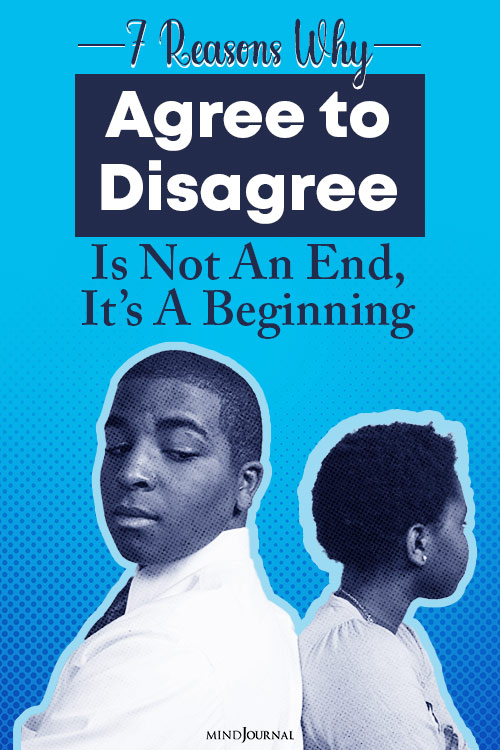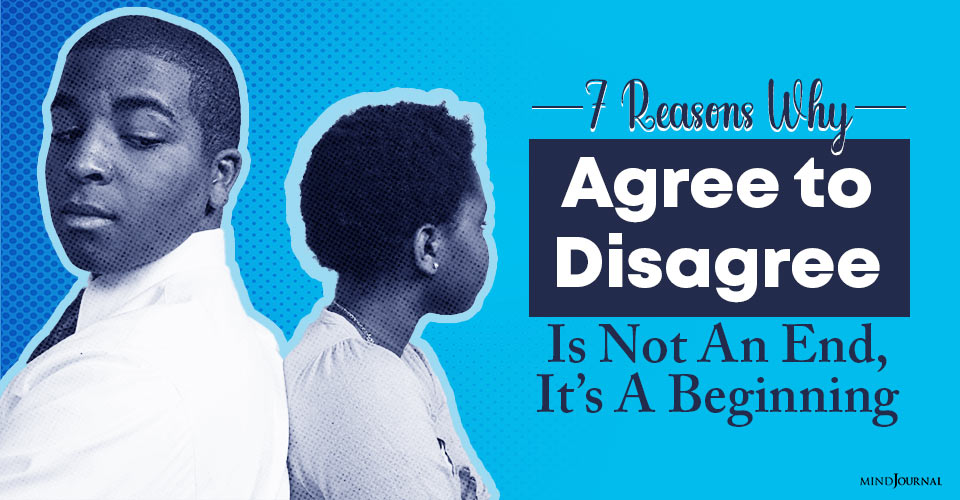It’s that familiar feeling of rising heart rate, that bolt of anxiety when someone we love or admire spouts ideas that we strongly oppose. Often these conversations end abruptly when one or both people exclaim in utter frustration, “Well, I guess we will have to agree to disagree.”
Who can blame us for this visceral reaction? Discussions about hard topics such as politics, religion, or social issues have ended decades-long friendships and eroded familial bonds. Talking about these things can feel like playing with fire.
The stakes don’t just feel high, they are high. These are not opinions about which breakfast cereal is best. These are our core values, our beliefs, and often our personal identities at stake. Most humans want the world to be better, but we often have drastically divergent visions of what that should look like.
It is in this space of sheer impasse that I ask you to linger.
Related: 5 Effective Steps For Conflict Reduction
Disagreement Is The Beginning
The trope “agree to disagree” is often the end of conversations. But what if it was the beginning? What if the point of the conversation is not to agree, but to have a conversation? What would happen if instead of trying to change or control each other, we focus on seeing and understanding each other?
I am a conflict transformation specialist. In my book and courses, I coach people facing difficult conversations to 1) resist using control, 2) embrace disagreement, and 3) focus on relationship- and community-building.
In other words, I recommend agreeing to disagree before the conversation starts. It can be incredibly helpful to begin a conversation with, “Yes, I will talk about this difficult subject with you. But how about we decide beforehand not to try to change each other’s minds?”
Here’s why this works.
7 Reasons Why “Agree to Disagree” Is Not an End, It’s a Beginning
1. Disagreement Is Healthy.
A society without disagreement is not a stable or free society. In order for our ideas to be strong, they need to be able to be challenged. When someone takes the time to disagree with us in a respectful way, we should work to welcome it as a gift and an opportunity to sharpen each other.
When we learn to be less threatened and more welcoming of disagreement, many times the quality of our conversations improves.
Related: 7 “Love-Saving” Words You Can Use For Handling Conflict
2. When We Debate To Win, Winning Becomes A Distracting Goal.
Unless we are arguing in a formal debate setting, it’s all too easy to focus on clap-backs and “gotcha” moments while losing sight of the bigger picture: mutual edification and growth. This is especially problematic when one party is naturally better or more experienced in debate skills than the other.
While debate has its place, it can be beneficial to set it aside.

3. It’s Important To Challenge Cultures Of Control.
When we attempt to change someone’s mind and they resist, it’s incredibly tempting to exert control and dominance. Control not only creates imbalances of power, but it fosters frustration and resentment (a phenomenon known as “reactance”) and erodes trust.
The stark truth of a free society is that we can’t control other people or force them to believe what we want. Such attempts are fundamentally unjust. Even if we think our ideas are righteous and flawless, employing control or manipulation dampens our cause, muddles our communication, and hurts chances we might have had at fair persuasion.
4. Changing Our Minds Is Hard And Uncomfortable.
According to cognitive dissonance theory, most of us experience tension and frustration when we are presented with new information that challenges our belief systems. Learning new information or a new point of view can set off a domino effect of other beliefs we hold that may also be challenged. Even our relationships can be challenged when we change our minds.
As we grapple with the dissonance of holding conflicting ideas at once, having someone attempt to control or force us into an agreement may exacerbate that tension. Under pressure, someone experiencing cognitive dissonance may be more likely to reject new information instead of grapple with it to its full and reasonable extent. In other words, changing our minds is hard enough without someone pressuring us to do so.
Related: The 5 Faces Of Fundamental Human Conflict
5. When We Suspend Our Need To Convert, We Make Space To Learn.
If I walk into a room where I know people are going to try to change me in any way, I am going to walk in defensively. However, if I walk into a room where I know I am allowed to disagree, and I will be treated with respect, I will not only be less defensive but it’s also more likely that I will be interested to learn about what others think as well.
When our guards can come down and we understand a broad range of ideological choices are available to us, our curiosity can thrive.
6. Reasoning With Each Other Strengthens Relationships.
As we learn to engage in an impasse, we will have more opportunities to give credit where it’s due. Statements like, “You make a good point…” “I agree with you that…” and “That’s something we share in common…” are powerful ways to show a conversation partner we are reasonable and well-meaning.
Demonstrating that we want to believe the best about someone boosts respect and collaboration.
7. Persuasion And Sharing Power Must Co-Exist.
True persuasion—ethical persuasion—does not attempt to shame or dominate. It invites conversation, arguing passionately and wholeheartedly for a belief, but stops short of overpowering or manipulating.
When the goal is to share power, not to hoard power, we invite transformation and strengthen relationships instead of tearing them down. Even if we never agree, we will have built relationships that can better handle disagreement—and that is a worthy endeavor in and of itself.
In short, how do we make talking about hard things less horrible and scary?
The answer lies in the simple art of discussion. Not converting, not dominating, not shaming, not rejecting, not name-calling, not controlling, not debating, not forcing agreement or resolution.
Related: 5 Ways To Stay Calm During An Argument With Your Spouse
Simply. Talking.
Letting people around us be where they are and meeting them there. Asking them to see us, as we see them. Appreciating their values, seeing their feelings, their worries, their fears. Giving them credit where it’s due. Showing kindness even across great difference and frustration.
The learning that can come from this kind of communication is tremendous. When we throw off animosity and choose to meet each other in respect, we create a shame-free environment for anyone to say, “You know, I never thought about it that way.” In such a space, growth and education are the focus, not winning or losing.
People are able to change their minds freely, because they want to, not because they are submitting to a dominant force. Therefore, appreciating a new perspective doesn’t have to threaten their pride.
Strangely enough, letting go of the need for control can sometimes bring us the agreement we most desire. And if it doesn’t, at the very least, we will have had a great conversation.
References:
Martin, Melody Stanford. "What is Conflict Transformation?" BraveTalkProject.com, December 29, 2019. https://bravetalkproject.com/what-is-conflict-transformation/ Vollmer, A., & Vetter, A. (2017). "Disagreement as an opportunity, not a threat [Review of the book Constructive controversy: Theory, research, practice, by D. W. Johnson]." Peace and Conflict: Journal of Peace Psychology, 23(2), 191–192. https://doi.org/10.1037/pac0000242 Steindl, et al. "Understanding Psychological Reactance: New Developments and Findings" Zeitschrift für Psychologie 2015; 223(4): 205–214. https://www.ncbi.nlm.nih.gov/pmc/articles/PMC4675534/ Buckley, Thea. "What happens to the brain during cognitive dissonance?" Scientific American Mind 26, 6, 72 (November 2015) doi:10.1038/scientificamericanmind1115-72b https://www.scientificamerican.com/article/what-happens-to-the-brain-during-cognitive-dissonance1/ McLead, Saul. "Cognitive Dissonance Theory" SimplyPsychology.org, Feb 5, 2018 https://www.simplypsychology.org/cognitive-dissonance.html. Inesi, et al. "Power and choice: their dynamic interplay in quenching the thirst for personal control" Psychol Sci. 2011 Aug;22(8):1042-8. doi: 10.1177/0956797611413936. Epub 2011 Jun 24. https://pubmed.ncbi.nlm.nih.gov/21705519/
Contact Melody at melodystanfordmartin.com. for such informative articles.
Written By Melody Stanford Martin Originally Appeared On Psychology Today









Leave a Reply
You must be logged in to post a comment.